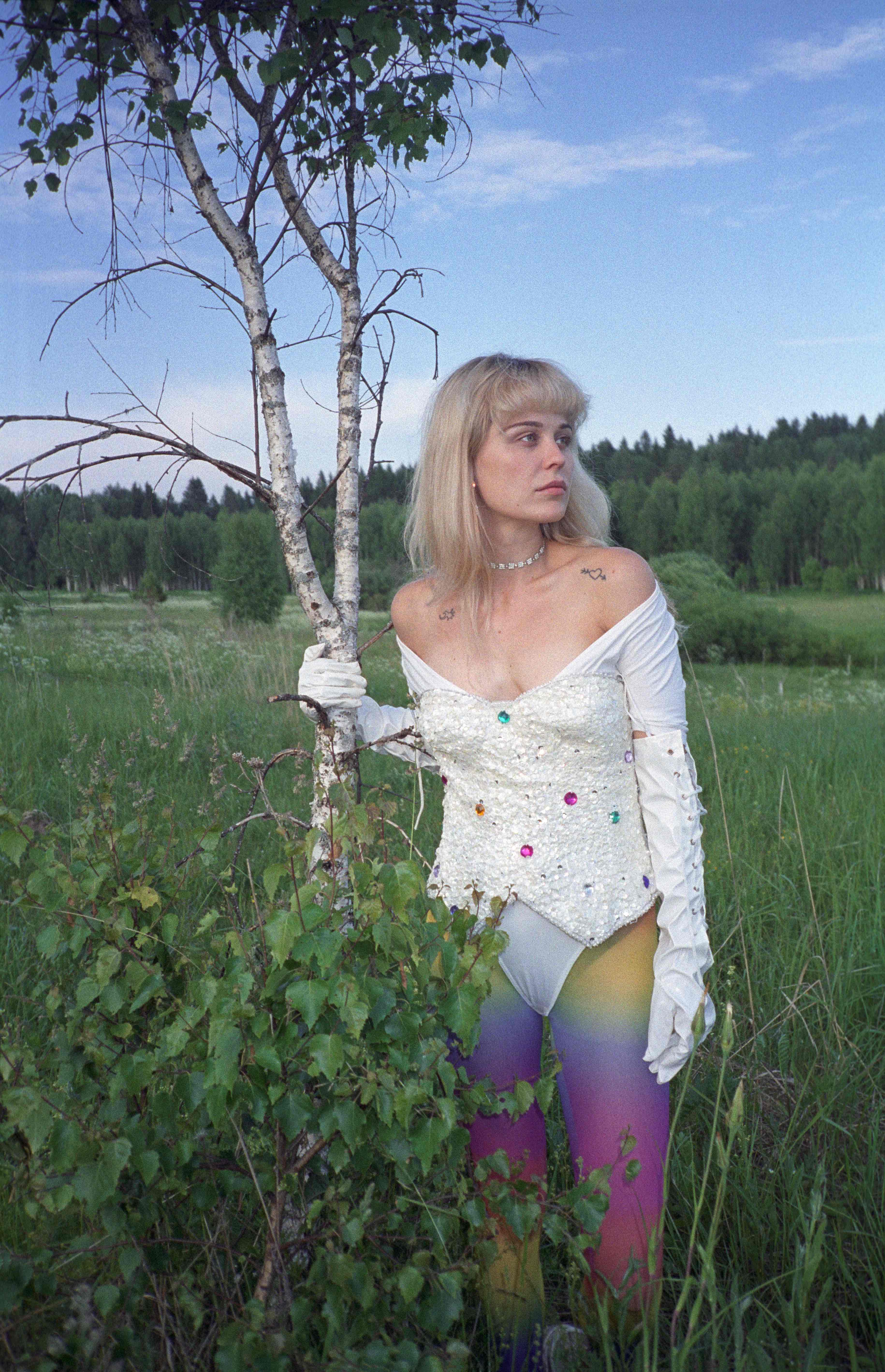Premiere: Meet Electro Nymph Kedr Livanskiy
An export of Russian youth culture, her inspo ranges from Soviet folk to T.a.T.u.
If you sprinkled Werner Herzog, T.a.T.u. and a Russian nesting doll into a cauldron, the resulting elixir might look and sound something like Moscow-based electronica musician Kedr Livanskiy, whose sound is informed by everything from Soviet folk music to art-house film. While she doesn’t consider herself “underground,” as the buzz tends to frame her, Livanskiy has found drumbeats of support across such niche corners as the Grimes sub-reddit. Indeed her latest beat-laden ballad, “Sky Kisses,” conjures early Grimes—as does Livanskiy’s taste in nature-core. While she studied music and film in school, she traces her holistic sound and style to a rural upbringing in her grandmother’s village. “It taught be to feel nature subtly—to identify with all human processes, emotions and situations,” she tells us. Underground or not, Livanskiy’s esoteric roots are bound to increasingly see the light of day.
See below for Livanskiy’s “Sky Kisses,” off her forthcoming LP Your Need, plus her takes on “backwards” Russian fashion, the brilliance of T.a.T.u., and more.
V What is your musical background? Are you formally trained, self-taught, or is it a mix?
Kedr Livanskiy My respective educations in literature and cinematography help me in writing lyrics and designing the visual components of my music; I often direct and cast my own videos. [But] I have been singing since childhood, and learned music from friends. I still think it’s important to continuously develop [my art] by jamming with friends and sharing experiences, because everyone’s approach is different.
V We read you grew up in your grandmother’s village. Can you tell us more about your early life and how it led you to music/art?
KL I spent half my childhood in Moscow, and the other half in the village with my grandmother, yes. She and her sisters sang Soviet folk songs constantly, in everyday life. It was my grandmother who instilled my love for music; she knew how to sing with all her heart.
V You’ve cited Werner Herzog as an influence. Who/what are some other films/filmmakers that have influenced you?
KL Surely Herzog [is an influence], as are Soviet directors like Kira Muratova, Andrei Tarkovsky and Marlen Khutsiev; American filmmakers like Hal Hartley, Jim Jarmusch and David Lynch—especially for the music they integrate into their films; Last Picture Show by Peter Bogdanovich, who is the J.D. Salinger of cinema, in my opinion; And finally Black Moon, by the magical alchemist of film, Louis Malle.
V Young, Russian musicians are often covered by U.S. media as being “underground.” Do you consider yourself underground? Is there a mainstream electronic scene in Russia to which you see yourself in opposition?
KL In my opinion, there is no underground at all in the modern world. However, I can divide artists by two groups: those who follow the trends and are very focused on the listener, [taking care] not to lose their audience by [abiding by] the laws of the market; and those who ignore the laws and go their own way but may not be so commercially profitable, of course. I rank myself in the second group, of course [laughs]. In Russia, a new music scene has developed whose line of conduct I do not like; they are too eager for success and they put this ahead of the music.
V While Russian youth culture has emerged as a global trendsetter, you’ve talked about ’00s Russian music as attempting to mirror Western music/culture. One prominent example of this, to many Americans, might be T.a.T.u. What was your reaction to them or other attempts at crossover success?
KL T.a.T.u., when it emerged and to this day, is an absolutely brilliant project in pop culture on a global scale. Their producer thought globally. We all watched them in real time like it was a movie; it was more than music—it was a real-life reality show. Aesthetically, ideologically, and musically, it was very cool. [We thought] the girls themselves were very sincere, albeit very wild. They were broadcasting themselves and the producer managed to frame them properly.
V How big of a role does fashion play in your visual presentation as an artist?
KL Here in Russia, [fashion] is very bad and backward. I constantly refuse to shoot in our glossies. But I have great friends who are changing this at the local level. And if I need a shoot, I call them for help. I consider this important unconditionally. Clothes are not about brands, but about self-expression. If it is possible to supplement your reality through appearance, why not? But I don’t watch trends.
V What is your everyday clothing style? What or who are some “eras” or brands you typically draw from?
KL Most [of what I wear] is from the 80s, 90s, early 2000s. The last thing I bought was Dr. Martens, last September. Everything else comes to me from my friends, boyfriend, or my father’s sweatshirt collection—all second hand. I do not like going to the shops. I do not buy things on the internet. Clothes, as with books or records, tend to find me randomly.
